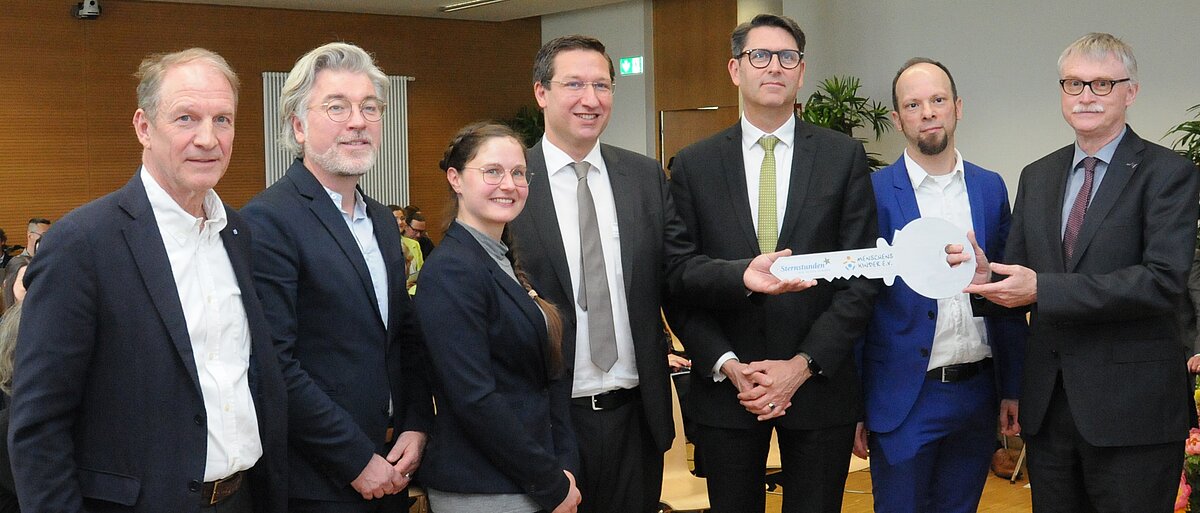
Mental health of children and adolescents: New prevention center opens – Alumni Uni Würzburg
Mental disorders are widespread in Germany. The DZPP is working to reduce their frequency.
With a ceremony, a scientific lecture program and numerous guests from science and politics, the German Center for Prevention Research in Mental Health (DZPP) officially celebrated its opening on Friday, April 19, 2024. The new building on the campus of the University of Würzburg offers scientists the opportunity to develop and test prevention programs in interdisciplinary working groups that aim to prevent mental illness in children and adolescents. The aim is also to evaluate the effectiveness of these programs and to make them available across the country.
The center
The German Center for Prevention Research in Mental Health (DZPP) was founded under the joint sponsorship of the Julius Maximilian University and the University Hospital of Würzburg. Its interdisciplinary structure makes it unique in Germany. The center places a strong focus on high-quality and innovative prevention research with high potential for widespread application. This includes a wide range of methodological approaches, from basic research to offers for schools and targeted approaches using virtual reality.
The scientists involved advise those affected, family members, schools and other institutions, thus forming a link between basic research and care structures.
The DZPP brings together a wide range of specialist disciplines: child and adolescent psychiatry, pediatrics, psychology, psychiatry, education, general medicine, epidemiology, computer science and many more. The multi-professional expertise is complemented by a broad, cooperative network, for example with the school system, youth welfare, the municipal system, authorities and politics.
The DZPP is headed by Professor Marcel Romanos, Director of the Center for Mental Health, Clinic for Child and Adolescent Psychiatry, Psychosomatics and Psychotherapy at the University Hospital of Würzburg. Dr. Arne Bürger is the managing director.
Homepage of the DZPP: https://www.med.uni-wuerzburg.de/dzpp/
The building
The DZPP is housed in a new building on the Hubland Nord campus of the University of Würzburg. In the three-story building with a good 580 square meters of usable space, around 230 square meters are available to the DZPP. The remaining space is intended for other users of the university. Construction took three years.
The construction of the building cost around 3.6 million euros, and the Würzburg State Building Authority was responsible for its planning and execution. The Würzburg-based support association Menschenskinder eV provided one million euros for the DZPP’s share. The association supports mentally ill children and young people in Lower Franconia; it raised the money from the Sternstunden eV initiative, a charity event run by Bayerischer Rundfunk. In addition, the support association recently presented a further donation of 10,000 euros to those responsible for the DZPP – a further contribution “to expand the prevention center and make it fully functional,” as it writes.
Another project partner is the Kaufmännische Krankenkasse (KKH), which already finances research projects on the prevention of mental disorders at the Würzburg location.
Voices at the opening
“The Sternstunden Prevention Center is the new home of the German Center for Prevention Research Mental Health DZPP. We are extremely grateful to Sternstunden eV for their trust in us and the idea of the DZPP. The institute is so special because it maps the entire chain of development of prevention programs through the collaboration of many different disciplines. The first step is the systematic development of programs, taking into account current scientific findings. The DZPP then also takes care of the consistent testing and scientific evaluation of the programs, right up to their dissemination across the country and the effects on the population. In this way, we have created a sustainable instrument that will serve the health of society as a whole in the long term.” Prof. Dr. Marcel Romanos (Head of the DZPP Institute)
“The opening of the German Center for Prevention Research on Mental Health in Bavaria is a milestone for mental health care. With its interdisciplinary approach, the center is unique in Germany and is intended to strengthen and protect people’s mental health in the long term. A center like this is therefore more important than ever. Unfortunately, mental stress has increased enormously in recent years. And this does not only affect adults. Children and young people in particular are also under great stress. I am pleased that we are all driven by our commitment to better mental health and to growing up more healthily.” Judith Gerlach (Minister of State for Health, Care and Prevention)
“Today’s opening is a milestone on the way to improving the quality of life of our children. It shows that through science, hope for a better future is possible. The Sternstunden Prevention Center will be a place where ideas flourish, innovations emerge and the mental health of our society is strengthened. The Julius Maximilian University is proud that we, together with the University Hospital of Würzburg, are the sponsors of this innovative center.” Dr. Uwe Klug (Chancellor of the University of Würzburg)
“With the new prevention center, we are further expanding the range of care offered by the University Medical Center Würzburg and supplementing the established inpatient and outpatient structures at the UKW. Mental illnesses often develop at a young age. This is precisely why the expansion and development of new preventive measures and early detection are extremely important. Ideally, this can reduce the risk of chronic illness. For example, it is known that intervention in kindergarten age helps prevent social behavior disorders. If we prevent illness in childhood, this has enormous effects on the entire lifespan, i.e. for many decades. Various disciplines are now being brought together in the center with the aim of developing innovative prevention programs for children and young people. This is precisely one of the core tasks of the University Medical Center. This new building makes this concretely visible. My thanks therefore go especially to everyone who made this new building possible, including financially.” PD Dr. Tim J. von Oertzen (Medical Director and Chairman of the Board, University Hospital Würzburg)
“Our aim as KKH is to offer effective prevention programs, especially for adolescents. With the German Center for Prevention Research and Mental Health, we have a partner who has set itself the task of developing, evaluating and disseminating precisely this evidence-based prevention. We are pleased to be able to continue four years of successful cooperation.” Tobias Bansen (Head of Prevention and Self-Help Department, KKH Commercial Health Insurance Company)
“The mental health of children and young people in Germany is not in good shape – three lockdowns have exacerbated psychological damage among the younger generation. That is why Sternstunden was very happy to support the construction of the Sternstunden Prevention Center and thus help to close the gap in the prevention of mental illness in childhood and adolescence.” Thomas Jansing (Chairman of the Board and initiator of Sternstunden)

Ethel Purdy – Medical Blogger & Pharmacist
Bridging the world of wellness and science, Ethel Purdy is a professional voice in healthcare with a passion for sharing knowledge. At 36, she stands at the confluence of medical expertise and the written word, holding a pharmacy degree acquired under the rigorous education systems of Germany and Estonia.
Her pursuit of medicine was fueled by a desire to understand the intricacies of human health and to contribute to the community’s understanding of it. Transitioning seamlessly into the realm of blogging, Ethel has found a platform to demystify complex medical concepts for the everyday reader.
Ethel’s commitment to the world of medicine extends beyond her professional life into a personal commitment to health and wellness. Her hobbies reflect this dedication, often involving research on the latest medical advances, participating in wellness communities, and exploring the vast and varied dimensions of health.
Join Ethel as she distills her pharmaceutical knowledge into accessible wisdom, fostering an environment where science meets lifestyle and everyone is invited to learn. Whether you’re looking for insights into the latest health trends or trustworthy medical advice, Ethel’s blog is your gateway to the nexus of healthcare and daily living.



